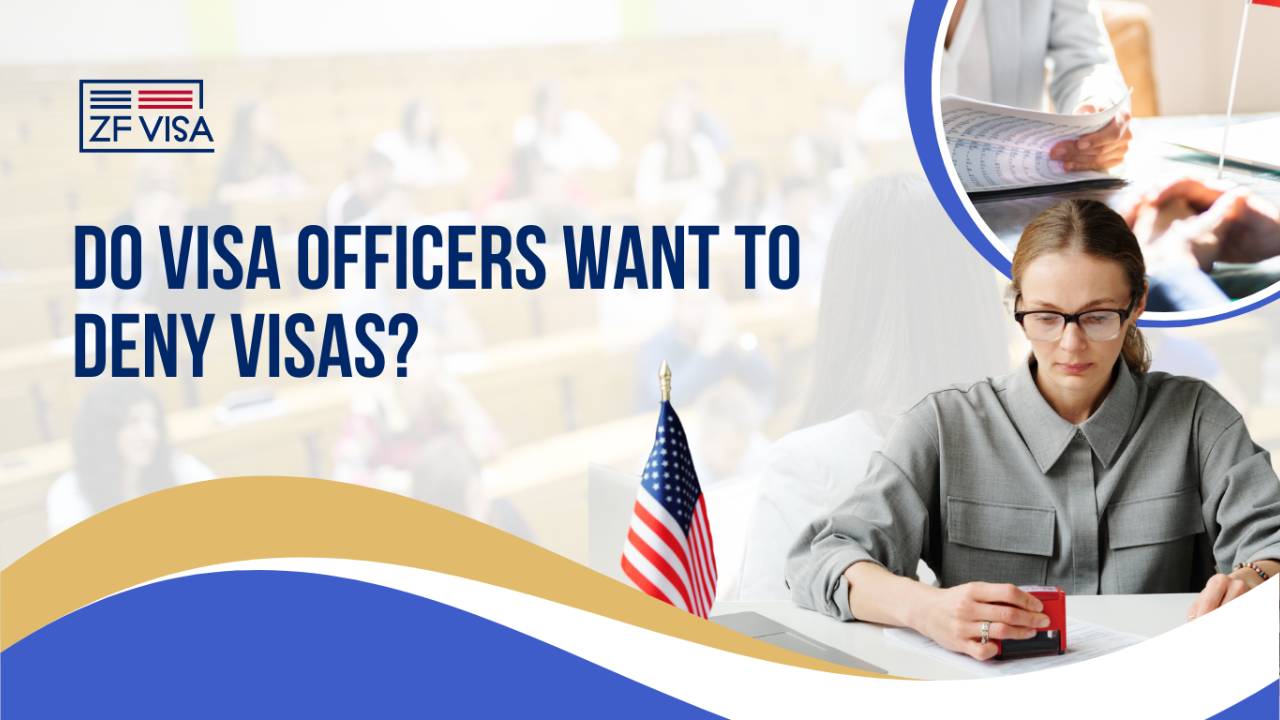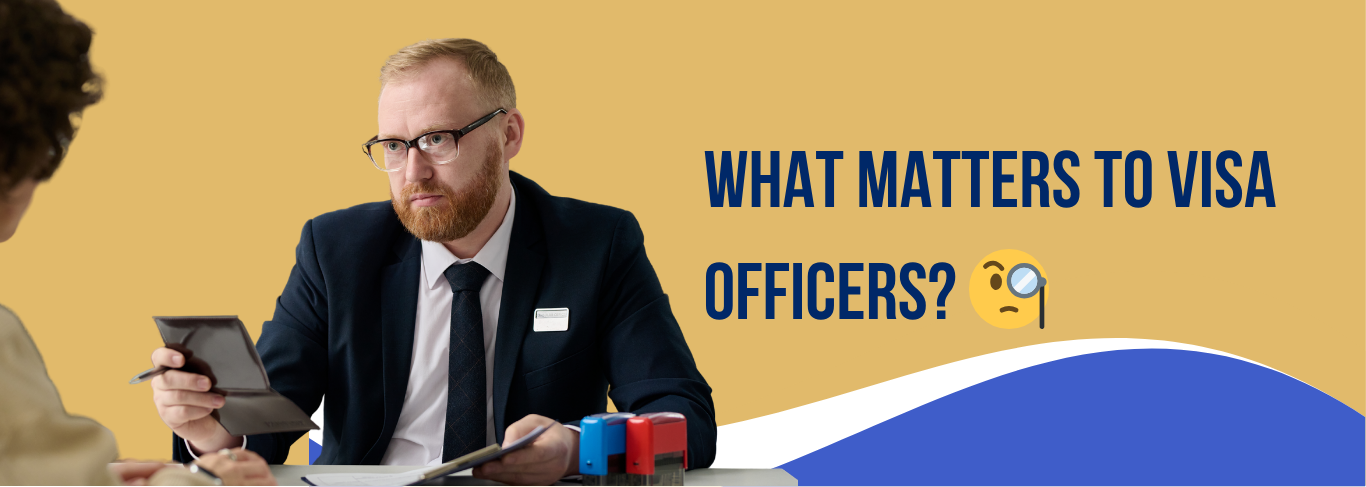
Do Visa Officers Want to Deny Visas?
Written by Travis and Mandy Feuerbacher, Former Visa Officers & Immigration Attorneys
Many people wonder if Visa Officers want to deny visas. As someone who has worked as a U.S. Visa Officer and an immigration attorney, Mandy Feuerbacher shares her perspective on the challenging yet essential role of visa officers. Let’s dive into what visa officers think about their job and the decision-making process!
The Stress of Being a Visa Officer 💼
Working as a visa officer at U.S. consulates and embassies is no easy task. Every day, officers must be ready to interview hundreds of applicants, often with as little as 60-90 seconds to make a potentially life-altering decision for each applicant. During Mandy's seven years as a visa officer, she faced the pressure of making profoundly important decisions for every individual who walked up to the window.
"There's no such thing as an easy day as a Visa Officer," Mandy says. "It's a demanding job where I had to constantly give my best to ensure the right decision was made."
Despite the stress, visa officers are passionate about doing their jobs right. They genuinely care about ensuring that people with legitimate reasons to travel to the U.S. are approved, and those who may not qualify or pose a risk to U.S. interests are identified.

Officers focus on several key factors:
- Plans in the U.S.: Visa Officers want to make sure that your plans in the United States are allowed under the visa you seek. For example, you aren’t allowed to enroll in a university program on a B1/B2 Visitor Visa, and you aren’t allowed to continue your current job remotely while studying on an F-1 Student Visa. Be prepared to explain your plans in the United States clearly and honestly.
- Immigrant intent: This is a primary concern for most non-immigrant visas, such as B1/B2 or F-1 visas. The officer must be convinced that your trip is temporary, and that you will return to your home country after your visit or your educational program concludes. Consider your “ties to home” – those reasons that you will be compelled to leave the United States, and be prepared to explain those ties during your interview.
- Finances: Before issuing any visa, officers will want to confirm that you have made sufficient financial arrangements to fund your trip, whether you are planning to study in the United States or just visit the Statue of Liberty.
- Previous violations: Previous legal violations in any country can pose a significant barrier to obtaining a visa.

It is your responsibility as the applicant to establish your qualifications for a visa. A Visa Officer can deny your application for virtually any reason if they are simply not convinced that you qualify, if there are simply too many open questions, or if specific concerns or ineligibilities arise during your interview.
Some common issues which may lead to a denial include:
- You appear as though you intend to stay in the U.S. permanently on a non-immigrant (e.g., B1/B2 or F-1) visa.
- Your Visa Officer suspects that you have other motives for visiting the U.S. that you're not sharing (e.g., you’re seeking a student visa, but you’re not really planning to study in the United States).
- Your Visa Officer is not convinced that you have made sufficient financial arrangements to pay for your trip or education.
- You violated a previous visa (e.g., you stayed in the United States longer than you were permitted).
- You have a permanent visa ineligibility, such as from a previous intentional lie or a criminal issue.
Sympathy vs. Doing Their Job 🤝
Visa officers may feel sympathy for your situation, especially in cases like family emergencies. However, their personal feelings don’t generally influence their decision. If the applicant doesn't establish that they meet the visa criteria, the officer must uphold the law and deny the visa, regardless of how they personally feel.

- Do visa officers actually want to deny visa applications?
No, visa officers do not want to deny visas. However, they are required to deny applications if they are not convinced that an applicant qualifies for the visa they seek. Their job is to follow and apply immigration regulations — not to be harsh or vindictive.
- Are visa officers trained to spot lies or trick people?
Officers are trained to identify discrepancies and other inconsistencies, but they are not trained or encouraged to trick applicants. Visa Officers take their job very seriously, and they strive to provide a fair and impartial consideration to each applicant.
- Why do some visa officers seem cold or uninterested?
Due to the volume of interviews they conduct daily, Visa Officers are expected to be efficient and focused. They don’t have time to connect personally with each applicant, and this can come across as cold or distant. Don’t expect an overly friendly conversation during your interview. Focus instead of introducing your situation and plans to demonstrate your qualifications for the visa you seek.
- Can visa officers feel empathy for applicants?
Of course! Many visa officers feel genuine empathy, especially in emotional situations. However, their decisions cannot be based on emotions or sympathy — they must stick strictly to immigration law and regulations.
- 5. Is it possible to change an officer’s mind during the interview?
Absolutely. For example, a Visa Officer may start to form a negative impression of your situation after reading notes entered by a previous officer who chose to deny your application. However, during the interview, the details you offer may lead to an approval. Remember, however, that it’s not a good idea to argue with a Visa Officer after they inform you of their decision.
- Do visa officers face consequences for issuing too many approvals or denials?
To be clear, there is no quota or limit on how many applications an officer must deny, or how many applications an officer may approve. Visa Officers review each applicant’s qualifications before making a decision.
Take the Next Step Towards Visa Approval
📩 Download: Your free step-by-step visa preparation guides, trusted by thousands of successful applicants. (Free F-1 Visa Guide & Free B-1/B2 Visa Guide)
🧳 Prepare: Enroll in our comprehensive visa interview course to boost your confidence and readiness.
Your approval isn’t based on luck - it’s based on preparation. Let’s make it happen!
Legal Note: The information provided does not constitute legal advice or a guarantee of visa approval. For specific legal guidance, contact ZF Visa & Immigration at [email protected].
Stay connected with news and updates!
Join our mailing list to receive the latest news and updates from our team.
We hate SPAM. We will never sell your information, for any reason.


